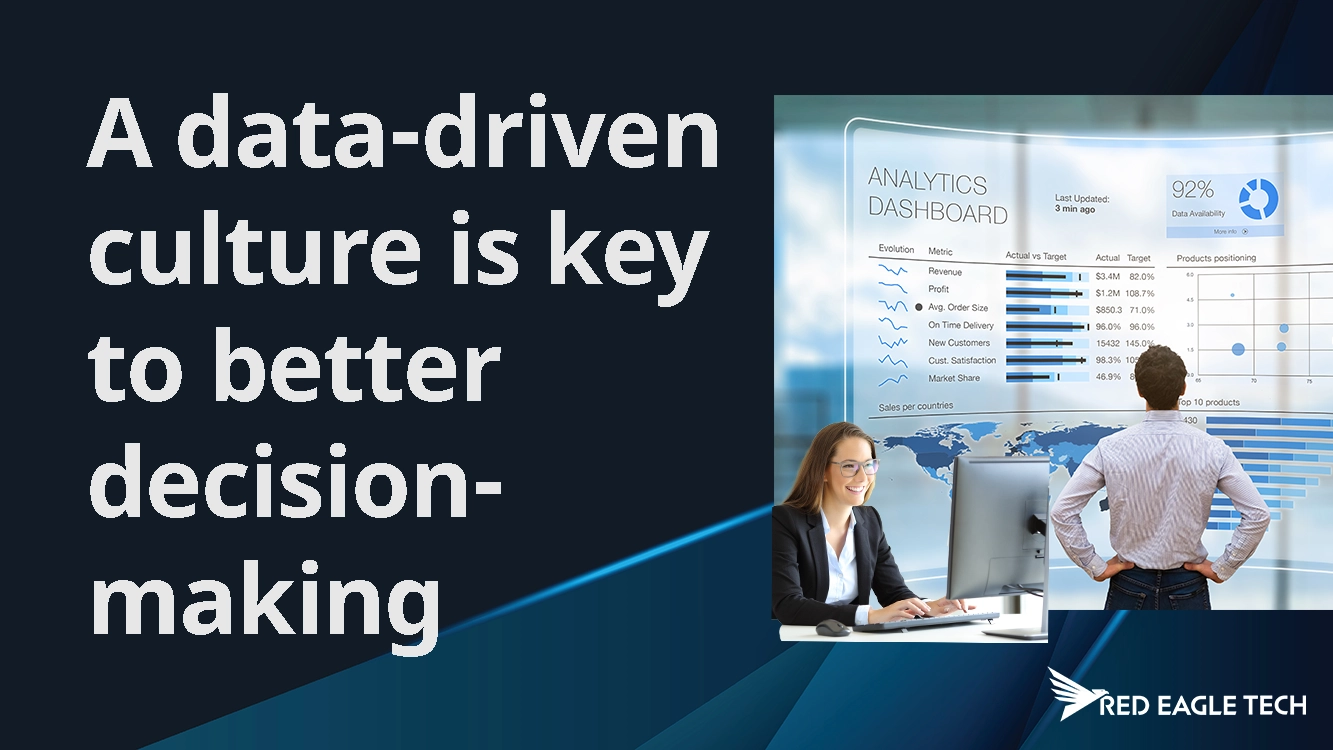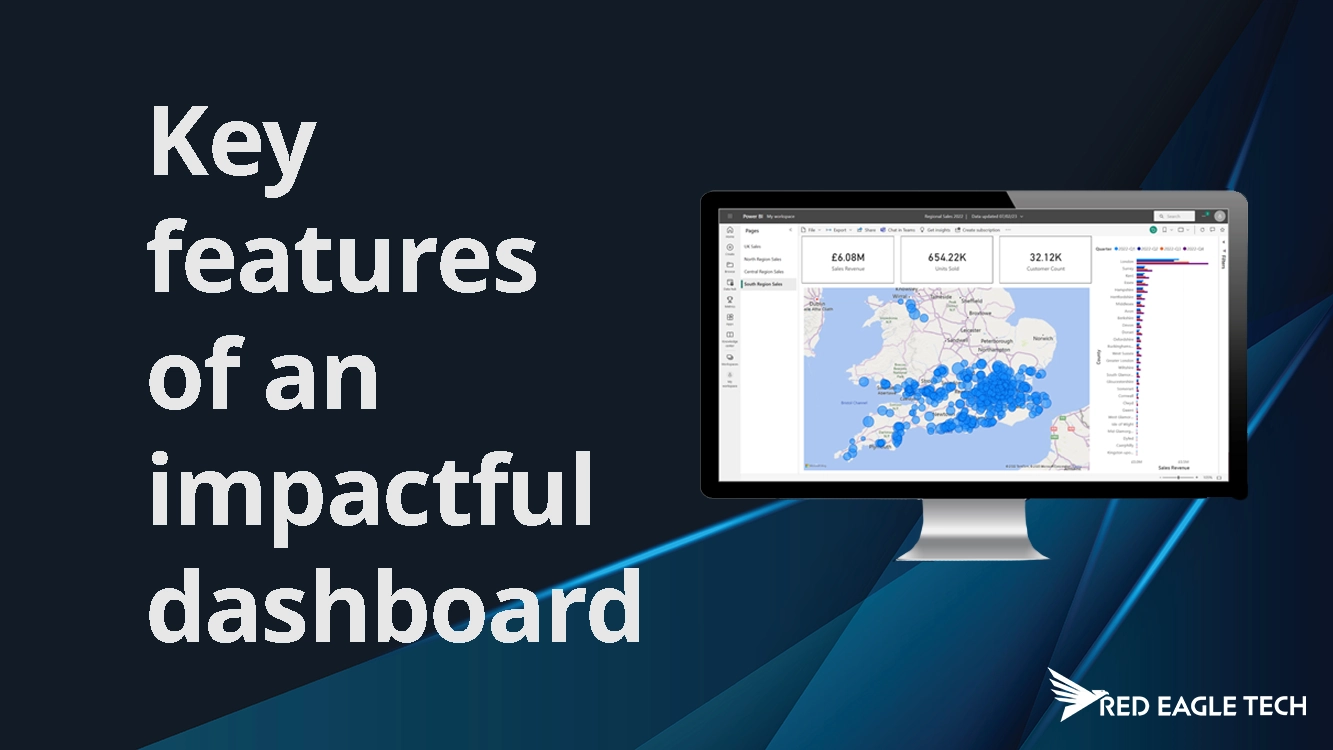
Business intelligence: boost your team's efficiency through a data-driven culture
Business intelligence tools are essential for businesses to make efficient, well-informed and data-driven decisions. But successful adoption of these tools is only achieved when all of your employees, not just leadership, are able to use them to analyse and interpret company data effectively.
Shifting towards a data-driven culture takes effort, but it's well worth it. This means providing the right training, tools and fostering a company mindset to ensure all employees can make confident decisions based on role-appropriate and easily accessible, real-time data.
Microsoft Power BI has an easy-to-use interface and self-service capabilities, and is a powerful tool that democratises data access, allowing employees at every level to explore, interpret and use data without relying on experts. Let's explore why creating a data driven culture is important and how to make it happen.
A data-driven culture - why is it important?
A data-driven culture means putting data at the core of every decision your business makes. When your team have easy access to the right data, and the tools to make sense of it, your business gets a big boost in how quickly and confidently decisions are made. And the payoff is real - research shows that companies with strong data-driven cultures are 5 times more likely to make faster decisions and 3 times more likely to improve customer satisfaction. Pretty compelling, huh?
How can Microsoft Power BI facilitate a data-driven culture?
Power BI is designed to make data easy for everyone, even for those that are not particularly tech-savvy. Here's how it can help facilitate a data-driven culture:
- Self-Service Analytics: With Power BI's super simple drag-and-drop setup, employees can create their own reports and dashboards without needing to hassle the IT team. This lets them explore and play around with data on their own, improving overall efficiency.
- Data Visualization: Power BI's interactive visualisations make even the most complex data easy to grasp, helping people in every department make smarter, faster decisions using real-time insights.
- Natural Language Queries: If employees are not sure how to dig into the data, Power BI's natural language feature lets them ask questions in plain, everyday language, making data analysis easy.
How to upskill your employees for data literacy
Sure, your employees might not need to be tech gurus to use Power BI, but they do need to know how to make sense of the data they're seeing. So, how do you make sure everyone's data-literate?
- Training Programs: Run regular workshops and hands-on training sessions focused on using Power BI to analyse data. This way, employees can feel more confident digging into the data that's relevant to their roles.
- Data Champions: Find the data enthusiasts in each department and make them your Power BI "champions." They can help their colleagues troubleshoot, improve skills, and get excited about data.
- Accessible Dashboards: Set up easy-to-use dashboards that show the key metrics for each department. This makes it super simple for employees to find the insights they need without getting overwhelmed.
The importance of real-time decision making with Power BI
Power BI lets you tap into real-time data, so your team can make quick, informed decisions based on the most up-to-date info. This is a huge plus, and particularly useful in industries like retail, healthcare and finance where making the right call at the right time can significantly boost performance. In short, it helps you stay ahead of the game.
- Finance: Kuwait's Golf Bank took steps to build a culture that embraces data. This lead to ambassadors working together to improve anti-money laundering models, improving customer experience and reducing risks and operational expenses.
- Retail: Leading retail chain Walmart used Power BI to create a scalable, cost-effective platform to format and present their financial data. They chose Power BI for its ability to deliver this information to end users quickly, easily and across platforms. This has given time back to employees, where previously they had to gather and interpret their own data.
- Healthcare: The NHS has adopted Power BI to automate tasks, provide real-time insights, and make better-informed decisions. Clinical analytics, patient monitoring, and operational metrics are streamlined, contributing to overall improvement of healthcare services.
Leadership matters most for driving change
While business intelligence tools like Power BI are instrumental in building a data-driven culture, its leadership that are key to making any overall company culture stick. Senior management should lead by example, using data in their decision-making processes and encouraging their teams to do the same. When leaders embrace a "data-first" approach, it shows everyone else just how important data literacy and accountability really are.
Building a data-driven culture: common challenges
- Resistance to change: Some employees might feel overwhelmed or unsure about the shift to using data. Providing ongoing support and showing them how tools like Power BI make their jobs easier can help smooth the transition.
- Data quality issues: If the data going in isn't great, the insights coming out won't be either. Making sure your Power BI system pulls clean, accurate data is crucial for building trust in the insights gathered.
- Lack of data literacy: Even with the best tools, some employees might struggle to understand or use the data effectively. That's why regular training and education on data literacy are so important, so everyone feels confident using data.
A data driven culture for business success
Building a data-driven culture isn't just about having the right tech - it's about helping your team think critically, ask smart questions, and base their decisions on solid data. With Power BI's easy-to-use analytics tools and a focus on data literacy, businesses can tap into the full potential of their data, leading to smarter decisions and better results.
Need help with Power BI? Our Business Intelligence experts at Red Eagle Tech are here to help. Contact us today for a free consultation on implementing Power BI and building a data-driven culture in your organization.

About the author
Ihor Havrysh
Software Engineer
Software Engineer at Red Eagle Tech with expertise in cybersecurity, Power BI, and modern software architecture. I specialise in building secure, scalable solutions and helping businesses navigate complex technical challenges with practical, actionable insights.
Read more about Ihor




































